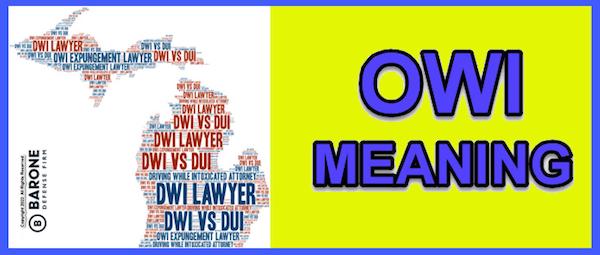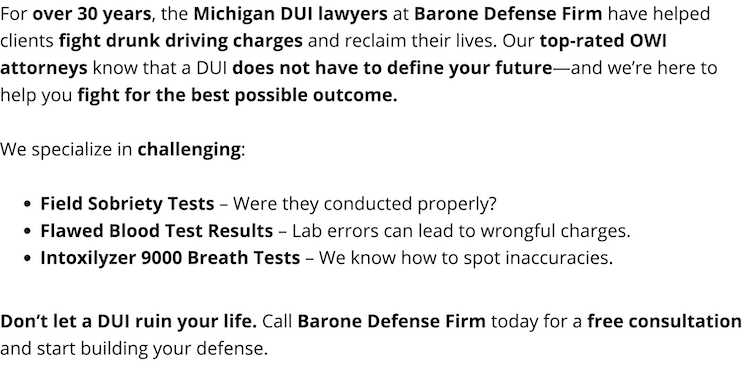OWI Meaning in Michigan: OWI Charge Same as DUI Offense
Operating While Intoxicated Michigan. For many of those facing an OWI charge Michigan, many online searches are conducted to learn more about a misdemeanor or felony drunk driving charge in Michigan. The goal of this article is to clarify the difference between DUI and OWI in the Michigan legal system, especially concerning cases involving the influence of alcohol or the influence of drugs.
First, be aware that Driving Under the Influence (DUI) and Driving While Intoxicated (DWI) are the two dominant terms identifying drunk driving offenses in the District of Columbia and over 40 more states. Michigan opted to not use either of those acronyms. Criminal lawyers in Michigan use the many acronyms interchangeably.
Unique in all the World, each state decides what conduct creates misdemeanor charges or felony charges. The State of New Jersey has no felony DWI charges, for example, even for a 4th offense. A 3rd OWI charge in a person's lifetime in Michigan will be a felony or misdemeanor criminal charge.

Michigan's OWI meaning, police language. This article is written by the OWI attorney in the State of Michigan who writes the books on drunk driving laws, Patrick Barone, who started Barone Defense Firm (BDF).
Mr. Barone and his team of Michigan criminal attorneys will clarify the OWI charge meaning, under Michigan laws. He and his other Michigan criminal lawyers help the reader understand "What is OWI arrest, and its short term and long-term consequences?"
The Michigan criminal law attorneys at BDF law offices are trained in the same "procedures" as Michigan's police officers. This includes multi-day training for all criminal defense attorneys at BDF on the standardized field sobriety tests and for learning how a forensic breathalyzer collects and analyzes a detained citizen's breath alcohol samples.
Google queries like, "What is an OWI offense?" abound, since 90% or the nation's population lives in either a DUI state or a DWI state, used in 41 of the states and the District of Columbia.
When the federal government began threatening states to pass tougher impaired driving laws in the late 1940s, their leverage was withholding federal highway funding. States began the process of re-drafting their laws. Later, NHTSA was made a part of the federal DOT, in 1970, and major changes to highway safety legislation began to occur.

Impaired Driving vs OWI Michigan: Sorting Out the Legal Issues
Disputes arose about whether the vehicle had to be moving (i.e., seen in motion). That was because many suspected drunken drivers had crashed, or possibly just stopped on the shoulder of the road (or sometimes in the middle of a road, at a red light).
Impaired driving vs DUI Michigan. Another line of dispute among the states was whether the "vehicle" had to be powered by a motor. So, today, many states arrest suspected drunk "operators" who are on horses, cows, bicycles, or wheelchairs.
States like Georgia only criminalize "motor" vehicles, and not all the other means of "carriage." Cross the state line from Georgia to Tennessee, though, and riding a horse while drunk will be a DUI crime in the Volunteer State.
OUI vs DUI Michigan. Due to Michigan calling its driving while intoxicated charge "OUIL" until 2003, many will search for that acronym or type in "OUI charge in Michigan," while looking for more information.
OWI vs DUI Michigan. So, in the early days of police enforcement, the OUIL abbreviation was similar to the OUI acronym still used to identify OUI driving by Maine, Massachusetts, and Rhode Island. Today, Michigan is one of three states (Wisconsin, Indiana, and Michigan) that refer to the driving intoxicated crime as "O.W.I."
What Are the Current DUI-OWI Punishments in Michigan, 1st Offense OWI & Others?
Here are the punishments for DUI and OWI convictions under Michigan law. A first-time offense OWI can require up to ninety-three (93) days of jail time, plus to pay fines of $100 to $500, and perform 360 hours (45 eight-hour shifts) of community service hours.
In addition, the convicted person's driving privileges may face additional restrictions, such as the immobilization of their vehicle (at the court’s discretion). This is ordered in some high BAC cases. Plus, the sentencing judge can require use of an ignition interlock device if the convicted driver is permitted to drive during the probation period, which is usually the balance of one year.
For a conviction on a first offense OWVI case, the same potential 93 days of jail time exists, but this lesser included offense has a maximum fine of up to $300, but with the same burdensome 360 hours of community service.
On a second offense OWI offense, a judge must impose jail time. This charge carries a minimum of (five) 5 days to one (1) year of incarceration. However, most judges in Michigan do not sentence offenders to a year behind bars, especially after the COVID-19 pandemic. Jail sentences can range from between two weeks and two months.
The 2nd offense DUI maximum fine is up to $1000, with $200 being the minimum fine. With many people now out of work, some judges are waiving fines. The sentencing judge may also sentence that offender to thirty (30) days of community service hours (240 total hours) but no more than 90 (days or 720 total hours). Plus, for a second OWI offense, your car may be required to be equipped with an ignition interlock device, which you pay to install, maintain, and to later disconnect.
Every lifetime 3rd OWI offense in Michigan constitutes a felony. That third offender faces as much as five (5) years in state prison, so fighting these cases may be needed. A Michigan 3rd OWI requires a minimum 30 days in jail, which our statute says must be served in custody.
As with all OWI Michigan crimes, the community service hours will increase for the felony third offense OWI to 60 days (480 hours) of community service. The maximum community service a judge can order is 180 days or 1440 hours. The judge has the option of ordering a mandatory vehicle immobilization and may or may not allow later use of an ignition interlock device during the probation period.
Long-Term Consequences of an OWI Charge
An OWI charge becomes a part of your criminal record, which can follow you forever. Whenever someone runs a background check on you, the charges appear. This could impact your ability to get a job, as some employers consider your criminal record as part of the hiring decision. Being absent from work for court appearances or jail time could also impact your employment.
You could face travel restrictions once you have an OWI conviction. For instance, Canada often restricts people from entering the country if they have DUIs. Other countries have similar entry restrictions, which could interfere with your travel plans. If you're on probation, you might also face restrictions on how far you can travel.
Another major long-term consequence of an OWI is the impact on your insurance. You can expect an increase in your insurance rates after the violation. You likely need an SR-22 certificate, which could limit which insurance companies offer you an insurance policy.
Defending Against an OWI Charge
You don't have to just accept the severe penalties that often come with a DUI conviction. Hiring an OWI attorney is the most effective way to fight the charges and reduce your potential consequences. A defense lawyer advises you on steps that could minimize your sentence. They also customize a defense strategy based on your situation. Some potential legal defenses include:
- Faulty breathalyzer results
- Flaws in the field sobriety test procedures
- Unlawful stops
- Medical conditions that could affect the results
- Procedural violations
Early legal intervention allows your DUI lawyer to gather evidence while it's still available. They may be able to negotiate reduced charges or alternative sentencing options.
What to Do After Being Charged With OWI
Facing an arrest for DUI can be scary, especially for first-time offenders. The most important thing to do is to remain calm and comply with the officers. However, it's also important to remain silent and avoid admitting anything. You don't have to talk to the police.
Contact an experienced DUI attorney immediately to have guidance throughout the process. A lawyer represents you at every stage and can help you avoid being intimidated by police or prosecutors. When it comes to hiring an attorney, don't wait.
It's also important to preserve all evidence you have access to. If you have a dashcam in your car, save the recorded footage of the incident. Receipts from any establishments you visited can show how much you consumed and help create a timeline. Contact information from witnesses may also help. If you think an item could be potentially helpful, keep it and share it with your attorney.
Michigan OWI Attorney Near You
Barone Defense Firm serves clients who are charged with DUIs across the state, in areas including Rochester, Grand Rapids, Troy, Holland, Birmingham, Grand Haven, Plymouth, Hudsonville, Royal Oak, Bloomfield Hills, Novi, Ann Arbor, and Farmington Hills. We believe all Michigan residents deserve high-quality legal representation to fight OWI charges.
Our team is highly experienced and boasts a proven track record of positive outcomes. We have a deep understanding of the Michigan DUI laws and familiarity with various local courts that hear the cases. You receive a personalized defense tailored to your unique circumstances. No matter where in Michigan you live, you can get the help you need from Barone.
 Barone Defense Firm Home
Barone Defense Firm Home
















